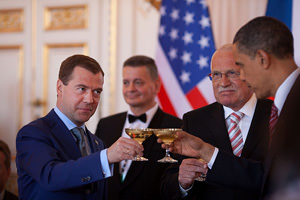The World Prefers Obama’s America
As approval ratings for Barack Obama decline at home, world opinion of the United States is rising steadily under his stewardship.
As approval ratings for Barack Obama decline at home, world opinion of the United States is rising steadily under his stewardship.
A new international survey by the British Broadcasting Co. reveals that views of the U.S. around the world “improved sharply” during the first year of the Obama presidency, with positive opinion outweighing negative for the first time since 2005, when the BBC first polled this question.
Whether the improvement helps him politically or not, Obama’s popularity abroad — and the contrast between his policies and those of the preceding administration — will enhance American influence and advance American interests.
The BBC’s findings, derived from a four-month survey that reached nearly 30,000 people in 28 nations, clearly demonstrate the significance of what pollsters call “the Obama effect.”
In half of the nations surveyed, positive views of the U.S. had fallen to a record-low average of 28 percent in 2007, from 38 percent in 2005, but began to recover to 35 percent in 2009 and 40 percent this year. Of all 28 countries surveyed — which ranged from Mexico, Brazil, Germany, Italy and Portugal to Turkey, Pakistan, Indonesia and China — only six now show a negative view of the United States, with two neutral and 20 favorable.
In a single year, since 2009, upbeat views of the U.S. rose by 21 percent in Germany and 18 percent in Russia; downbeat views dropped by 23 percent in Spain, 14 percent in France and 10 percent in the United Kingdom, with the result that all three lean toward a positive view of the country.
In two of the countries surveyed, more than 50 percent were found to have a negative view of the United States — and those, unsurprisingly, were Pakistan and Turkey, where the war in Afghanistan is probably driving down our reputation. Around the world, however, the upward trend is unmistakable.
At a time of global economic dislocation, much of which can fairly be blamed on American corporations and policies, such recuperation is remarkable. It is even more notable because world perceptions of China and Russia are simultaneously worsening. America did not always lag behind Europe in global popularity, as it does today. Our global economic and political influence remained stronger than that of any other country in history through the end of the Bill Clinton presidency, despite the tension, cynicism and often lethal stupidity of the Cold War era.
Following the Sept. 11 attacks, that traditional approval was bolstered by a wave of international sympathy, extending even to such traditional adversaries as Cuba and Iran. But the good will that could have been harnessed in service of our best purposes was simply wasted by the Bush administration, whose invasion of Iraq, use of torture and disregard for the rule of law inflicted grave damage on our reputation.
But why should any of this matter to Americans, who have long cultivated a reputation for disdaining world opinion? Why should we care about “soft power” or “smart power,” as such influence is known in foreign-policy jargon, when we still maintain the most powerful armed might ever known to humankind?
The answer is that we live in an increasingly interdependent world, where military force is almost never sufficient and often irrelevant to addressing the problems we confront. Whether seeking to reduce the threat of nuclear weapons and fissionable materials, erecting sanctions against the mullahs in Iran or reducing the effects of climate change, we will find that reputation is at least as important as raw power. Having squandered so much of our economic strength in mindless war and wasteful speculation, we must rely on lenders and customers in other countries to rebuild.
Obama knows he cannot reach any of his foreign-policy objectives without international cooperation. More important, he understands that the future of America’s children is connected inextricably with that of their generation around the world. Restoring a reciprocal esteem with the rest of humankind — a deep aspiration of this country’s founders — will benefit them for decades to come. He deserves great credit for the success he has achieved so far.
Joe Conason writes for The New York Observer.
© 2010 Creators.com
Your support matters…Independent journalism is under threat and overshadowed by heavily funded mainstream media.
You can help level the playing field. Become a member.
Your tax-deductible contribution keeps us digging beneath the headlines to give you thought-provoking, investigative reporting and analysis that unearths what's really happening- without compromise.
Give today to support our courageous, independent journalists.






You need to be a supporter to comment.
There are currently no responses to this article.
Be the first to respond.